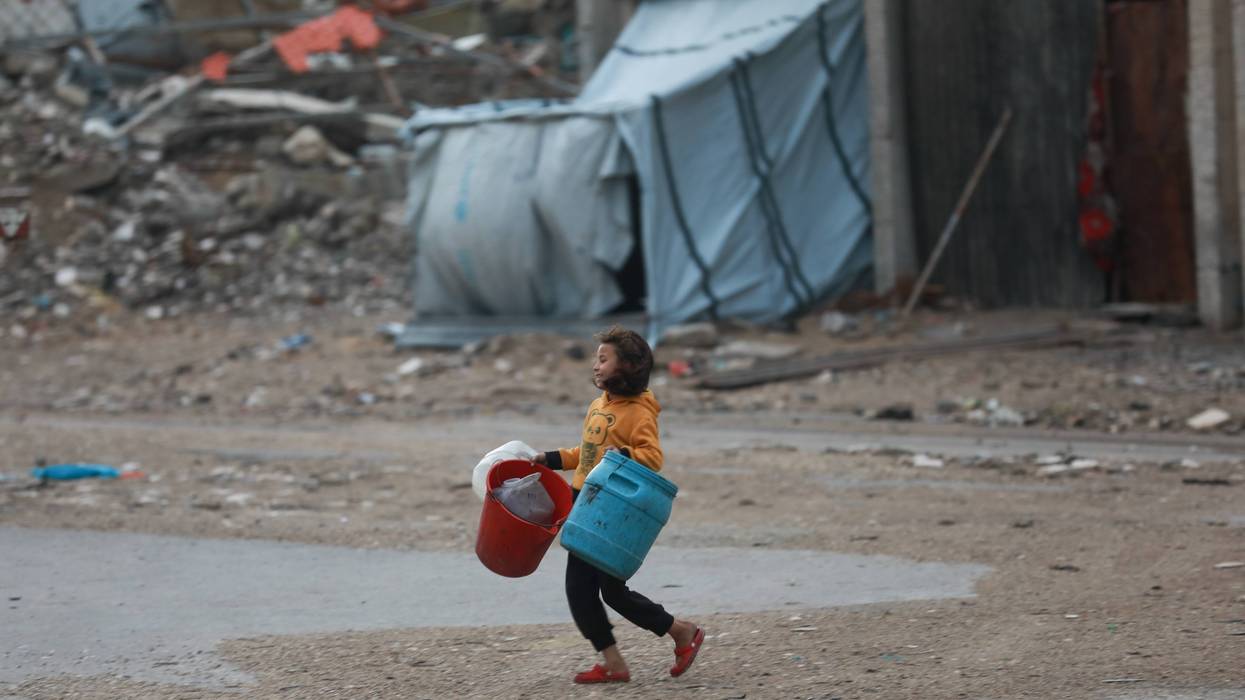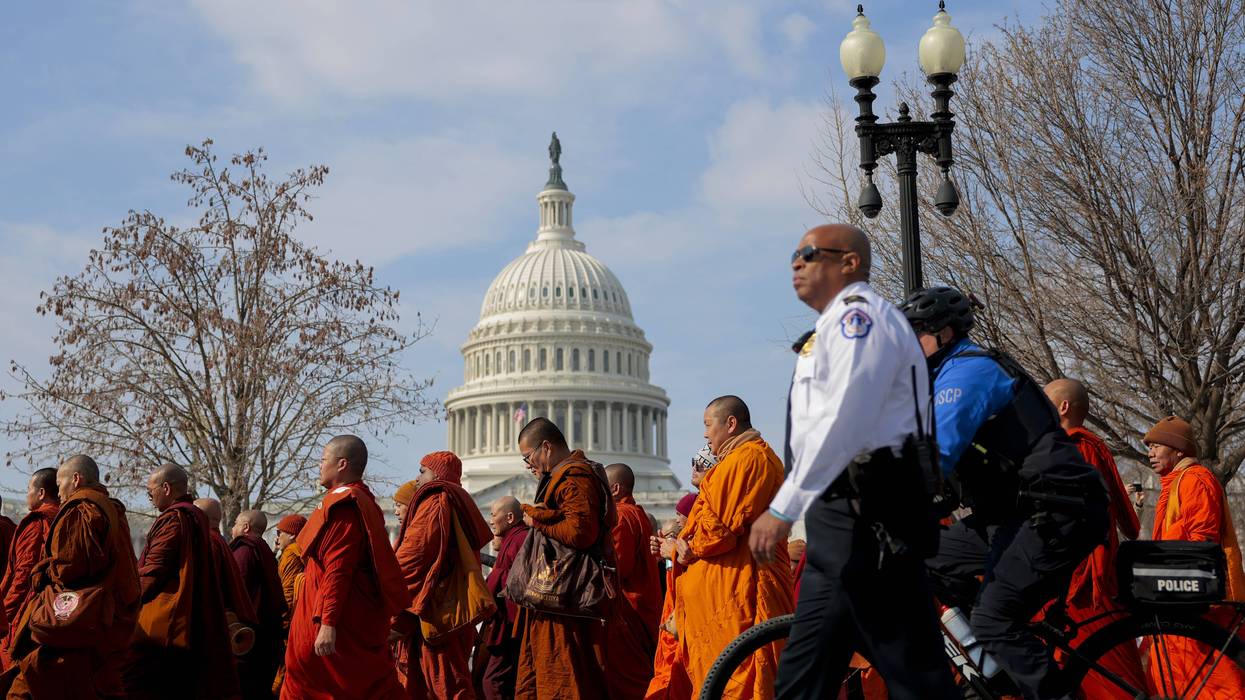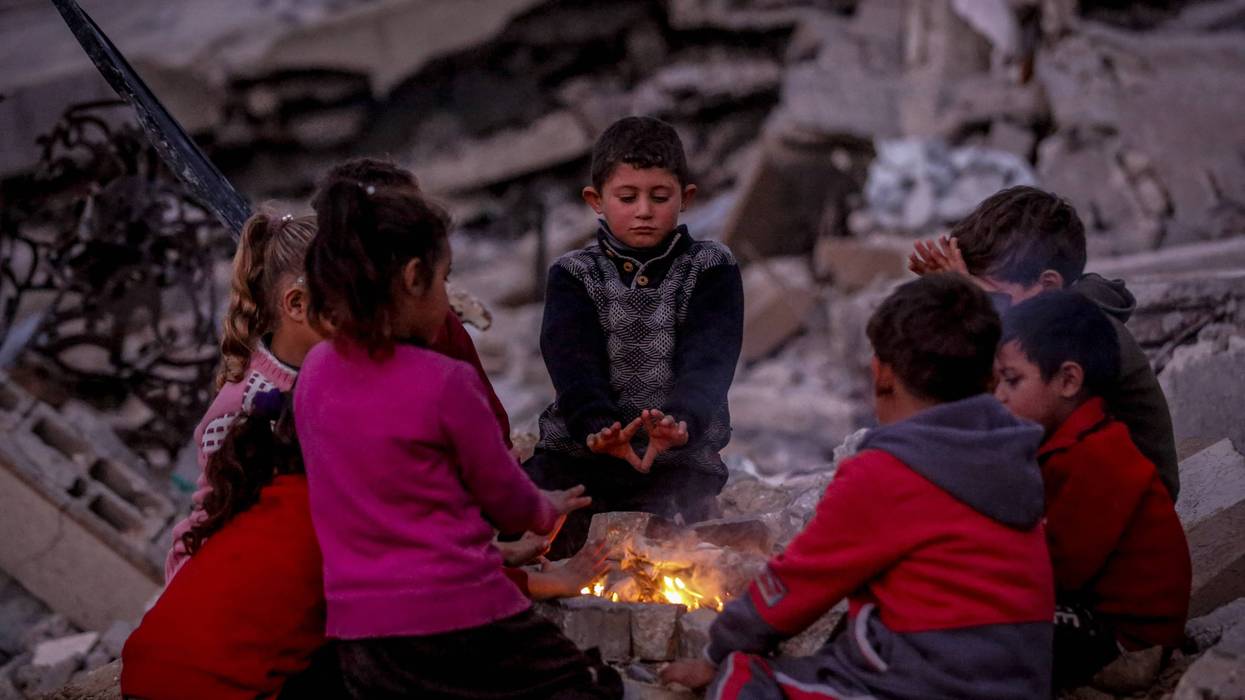Trump Is Right to Discuss His Gaza Peace Plan and the Melania Film in the Same Speech
Ironically, his framing of his plans for Gaza as in some way like the Melania film displays a Freudian slip, a rare moment of complete honesty, since both are just for show, with no reality behind them.
President Donald J. Trump convened his so-called “Board of Peace” in Washington, DC, on Thursday. Some two dozen formal member states attended, and a similar number of international observers.
Trump again lied in saying that he had resolved eight wars, even as he seemed intent on fomenting one against Iran. Of Gaza, where the Israeli genocide continues with less visibility, he said, “Gaza is very complex. It’s been amazing. I want to thank Steve and Jared for an amazing job. Marco’s over there watching. Everybody’s fantastic. And JD, what a job they’re all doing.”
The Gaza so-called “ceasefire” has never actually been implemented, with continued Israeli occupation of over half the strip and continued bombardment and throttling of food and medical aid. It has not moved to the “second stage,” much less the third.
Trump’s Gaza project is like most of his gaudy con games, such as his university, which never educated any students and for which he had to settle out of court; or such as his border wall with Mexico, which will never be built nor will Mexico pay for it; or such as his regime change gambit in Venezuela, where he simply colluded in a coup with Nicolas Maduro’s vice president; or such as the Jeff Bezos film about Melania that has lost at least $60 million. As we will see, he more or less admits the justice of this last comparison. That is, his Gaza plans have no concrete reality, consisting of a mere Potemkin Village. In the meantime, the 2.3 million Palestinians in Gaza are sleeping rough and suffering food and medicine shortages and their children are not receiving an education, since Israel destroyed all the schools and universities.
Nothing constructive will come of all this verbiage and all this kowtowing to Trump by an assemblage of dictators, absolute monarchies, dusted-off generals, genocidaires, and far right-wing populists.
He said:
Albania, Kosovo, Kazakhstan have all committed troops and police to stabilize Gaza. Egypt and Jordan are likewise providing very, very substantial help, troops, training, and support for a very trustworthy Palestinian police force.
Andrew Roth at The Guardian reports that Morocco and Indonesia have also agreed to send troops. Indonesian President Prabowo Subianto said he would be willing to send 8,000 soldiers, and even more. President Prabowo, a former general, leads the world’s most populous Muslim country and is seeking a higher profile on the world stage.
The Guardian explains, “Maj Gen Jasper Jeffers III, the US officer appointed to command the future international stabilisation force (ISF), said the board planned to deploy 20,000 soldiers in five different sectors of Gaza, beginning with Rafah.”
This colonial military arrangement is a recipe for disaster. The foreign troops will almost certainly come into conflict with Hamas. And Israel has a long history of shelling United Nations peacekeeping troops in Lebanon. Since Trump cannot conceive of a genuine political solution that gives basic rights to the Palestinians, this overlay of foreign troops is simply a Band-Aid over a deep wound that will certainly break open again.
According to the computer-generated transcript at C-SPAN, which I had ChatGPT clean up, Trump announced:
But together, we’re committed to achieving a Gaza that is properly governed throughout the whole area is going to be, you know, so many countries that have really nothing to do with the Middle East, but they’re maybe somewhat close by.They’re all involved. They want to go in and fight. They tell me all the time, "We’d like to send soldiers to fight if it’s necessary."
And I don’t think it’s going to be necessary.
We have two countries that want to go in and do a number on Hamas.
I said, "I really don’t think it’s I hope it’s not going to be necessary because they made a promise and they promised me get rid of their weapons."
Looks like they’re going to be doing that, but we’ll have to find out.
But it’s no longer a hot bed of radicalism and terror.
And to end that we have uh today and I’m pleased to announce that Kazakhstan, Azerban, UAE, Morocco, Bahrain, Qatar, Saudi Arabia, Usbekistan, and Kuwait have all contributed more than 7 billion dollars toward the relief package.
Trump said that he would also put in $10 billion. That is $17 billion, if it ever actually materializes. Trump’s $10 billion almost certainly will not. In fact, it is not clear where he would get it from. I presume that the US Constitution has not yet been entirely abolished and that Congress is the body that appropriates funds. In any case, it is insufficient. The United Nations estimates that rebuilding Gaza will cost $70 billion.
The premise, that the conflict is resolved, is also faulty. Israeli cabinet members continue to push for the ethnic cleansing of the Palestinians. Hamas leaders have said that they will only lay down their arms if a Palestinian government is established in Gaza. Trump instead plans a colonial administration that in some ways resembles the one established by the League of Nations after WW I, which started the whole Mideast catastrophe.
Trump said in introductory remarks:
When I took office, the war in Gaza was raging with thousands of people being killed and no end in sight.
Today, thanks to unrelenting diplomacy and the commitment of many of the great people in this room, we have 59 countries signed up on Gaza.Think of that. We have uh it’s amazing. But all the people, many really so many in this room, the war in Gaza is over. It’s over. There are little flames. Little flames.
Hamas has been I think they’re going to give up their weapons, which is what they promised. If they don’t, it’ll be, you know, they’ll be harshly met. Very harshly met. They don’t want that.
You know, all the stuff like they don’t mind dying. They told me that’s not true. Everyone said, “Oh, they don’t mind dying.” No, they don’t want to die. They said, “We don’t want to die. People don’t want to die.”
The ceasefire was held and every last remaining hostage, both living and dead, has been returned back home. Think of that. That was an impossibility.
And we did hundreds of hostages, but the last 20, and I always said to Steve and Jared, I said, “The last 20 are going to be very tough. Very, very tough.” And we got them back.
We got the living back. And then we only got about 16 of the dead. And we said, “Well, you got to get them all. You promised them all.”
And they dug and dug and dug. You can imagine it’s a job that’s brutal.
And Hamas really did a lot of that work. And you got to give them credit for that. They uh they brought the last last one home a week ago.
And we got all 28 of them living and dead.
The amazing thing because I’ve never seen anything quite like it. The the parents of the dead, they knew their boy was dead. This case boys, all boys, men. But to the parents’ boys, they knew their boy was dead.
They wanted that dead body as much as if he were alive.
And when they got them back, there was great sadness, but there was great joy, too.
They wanted it as much as the people that got their sons back alive.
But we got a lot of people before those 20, Steve, what nobody talks about, but you know, hundreds of people.
Uh we did a good job and you guys did a fantastic job.
I want to thank every nation that helped us achieve this monumental breakthrough saving countless lives and really bringing peace and bringing the concept of peace because nobody thought peace in the Middle East.
I’ve always heard peace in the Middle East is impossible and it’s turned out not to be.
And we do have some work to do with Iran. They can’t have a nuclear weapon. It’s very simple. They can’t have you can’t have peace in the Middle East if they have a nuclear weapon.
And they can’t have a nuclear weapon. And they’ve been told that very strongly.
Since the hard one ceasefire of last October, the United States and our partners have facilitated the delivery of vast amounts of humanitarian aid, numbers that nobody’s ever seen before.
In November, the United Nations Security Council unanimously approved the Board of Peace.
And last month in Davos, we welcomed over two dozen members to this very important new organization and we are very closely working with the United Nations...
First I had an escalator that stopped. You know that it’s going up. Boom.
It’s lucky my movie star first lady was in front of me because I put my hand on a certain part of her body and I was able to stop my fall. otherwise because she had no trouble.
I said, “Boy, that was a very sharp stop, Johnny.”
So, I said, “That was strange. I’ve I’ve been on a lot of escalators. It’s never happened before. Usually, it stops very slowly. This was just boom, but our first lady was right in the proper location for me.”
I’m waving to people and uh she was holding on a little tighter. She knew what was happening. She did. She said she
That’s a very successful movie out right now. like number one. Can you believe this? And it’s a big movie big movie star.
And I always say it’s trouble because I always say there’s not room in one family for two stars. I told that we can’t have two stars in one family.
So I don’t know what that means, but it’s not it’s not good.
But it is good because we’re proud of her. She did a People in the United States love the first lady and she did the movie and it’s become the biggest selling documentary in 20 years. Can you believe?
The theaters are all packed. Women especially, they go back and they see it two or three times, four times.
I include the comments about the escalator and Melania and the part of her body and Trump losing his balance and his description of her as a movie star because Jeff Bezos funded a boondoggle flick that has earned $16 million on a $75 million production budget. These sorts of passages, which suggest mental imbalance, are usually edited out by the MSM. This one speaks eloquently about how the Trumps are at the center of his thinking even when he is discussing Gaza.
Ironically, his framing of his plans for Gaza as in some way like the Melania film displays a Freudian slip, a rare moment of complete honesty, since both are just for show, with no reality behind them.
I’m glad, and I think everyone is glad, that the living Israeli hostages were released and the remains of the dead were returned to their grieving families. Hamas’ hostage-taking, targeting innocent civilians for the most part, was an egregious war crime.
But it is astonishing that this man could jabber on like that about Melania and about his so-called ceasefire in Gaza for all that time and never mention the way its Palestinian population has been genocided, Gaza’s infrastructure destroyed, and tens of thousands of its innocent civilians slaughtered, including 19,000 children. And while it is true that he, unlike Joe Biden, forced the Israeli government to reduce the intensity of its campaign substantially, he hasn’t actually brought peace to the strip, where Israel has killed hundreds in recent months and where it continues to brutalize the civilian population.
Argentina, Armenia, Azerbaijan, Bahrain, Bulgaria, El Salvador, Hungary, Indonesia, Israel, Jordan, Kazakhstan, Kosovo, Mongolia, Morocco, Pakistan, Paraguay, Qatar, Saudi Arabia, Turkiye, United Arab Emirates, United States, and Uzbekistan are founding members of the BOP, and the following countries have indicated an intention to join: Albania, Belarus, Cambodia, Egypt.
The list consists for the most part of small countries or medium powers hoping to ingratiate themselves with the president for their own reasons. The US is the only democracy, if it is one anymore. Turkiye has become a competitive authoritarian regime and Israel rules 5 million Palestinians militarily without affording them any right to vote on their own destinies. Western Europe indignantly rejected Trump’s overtures.
Critics have complained that Trump, who made himself chairman of the board for life, is attempting to replace the United Nations—which he has defunded in an attempt to destroy it—with a body under his personal control.
It doesn’t matter. Nothing constructive will come of all this verbiage and all this kowtowing to Trump by an assemblage of dictators, absolute monarchies, dusted-off generals, genocidaires, and far right-wing populists. Palestinians are huddling in tents atop the rubble of their former homes, and babies are dying of hypothermia. We can talk about the “ceasefire” when that situation has been remedied.


